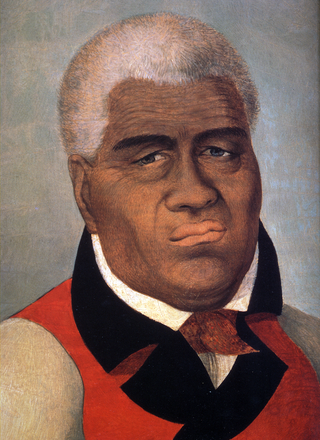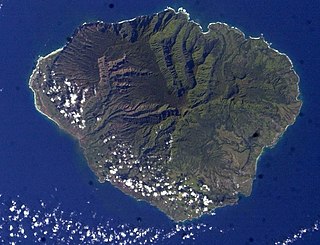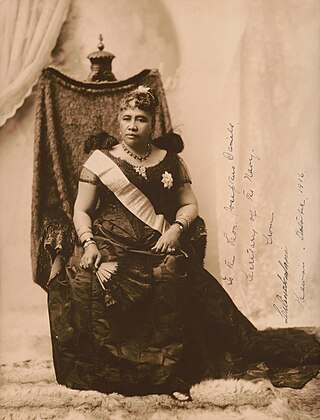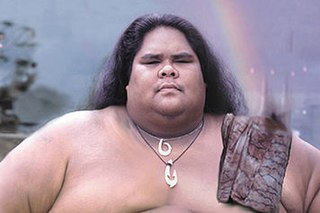
Hawaii is a state in the Western United States, about 2,000 miles (3,200 km) from the U.S. mainland in the Pacific Ocean. It is the only U.S. state outside North America, the only state that is an archipelago, and the only state in the tropics.

Honolulu is the capital and most populous city of the U.S. state of Hawaii, which is in the Pacific Ocean. It is the unincorporated county seat of the consolidated City and County of Honolulu, situated along the southeast coast of the island of Oʻahu, and is the westernmost and southernmost major U.S. city. Honolulu is Hawaii's main gateway to the world. It is also a major hub for business, finance, hospitality, and military defense in both the state and Oceania. The city is characterized by a mix of various Asian, Western, and Pacific cultures, reflected in its diverse demography, cuisine, and traditions.
Hawaiian is a Polynesian language of the Austronesian language family that takes its name from Hawaiʻi, the largest island in the tropical North Pacific archipelago where it developed. Hawaiian, along with English, is an official language of the US state of Hawaii. King Kamehameha III established the first Hawaiian-language constitution in 1839 and 1840.

Hawaii Five-O is an American police procedural drama series produced by CBS Productions and created by Leonard Freeman. Set in Hawaii, the show originally aired for 12 seasons on CBS from September 20, 1968, to April 8, 1980, and continues in reruns. At the airing of its last episode, it was the longest-running police drama in American television history and the last scripted primetime show that debuted in the 1960s to leave the air.

Oahu, also known as "The Gathering Place", is the third-largest of the Hawaiian Islands. It is home to roughly one million people—over two-thirds of the population of the U.S. state of Hawaii. The island of O’ahu and the Northwestern Hawaiian Islands constitute the City and County of Honolulu. The state capital, Honolulu, is on Oʻahu's southeast coast. Oʻahu had a population of 995,638 according to 2022 U.S. census estimates, up from 953,207 in 2010.

Kamehameha I, also known as Kamehameha the Great, was the conqueror and first ruler of the Kingdom of Hawaii. The state of Hawaii gave a statue of him to the National Statuary Hall Collection in Washington, D.C. as one of two statues it is entitled to install there.

Kauaʻi, anglicized as Kauai, is geologically the second-oldest of the main Hawaiian Islands. With an area of 562.3 square miles (1,456.4 km2), it is the fourth-largest of the islands and the 21st-largest island in the United States. Nicknamed the Garden Isle, Kauaʻi lies 73 miles (117 km) across the Kauaʻi Channel, northwest of Oʻahu. It is the site of Waimea Canyon State Park and the Na Pali Coast State Park.

Hawaii is the largest island in the United States, located in the state of Hawaii. It is the southeasternmost of the Hawaiian Islands, a chain of volcanic islands in the North Pacific Ocean. With an area of 4,028 square miles (10,430 km2), it has 63% of the Hawaiian archipelago's combined landmass. However, it has only 13% of Hawaiʻi's population. The island of Hawaiʻi is the third largest island in Polynesia, behind the two main islands of New Zealand.

Hawaiian Airlines is the largest operator of commercial flights to and from the U.S. state of Hawaii. It is the tenth-largest commercial airline in the United States, and is based at Honolulu, Hawaii. The airline operates its main hub at Daniel K. Inouye International Airport on the island of Oʻahu and a secondary hub out of Kahului Airport on the island of Maui. The airline also maintained a crew base at Los Angeles International Airport. Hawaiian Airlines operates flights to Asia, American Samoa, Australia, French Polynesia, Hawaii, New Zealand, and the United States mainland. Hawaiian Airlines is owned by Hawaiian Holdings, Inc. of which Peter R. Ingram is the current president and chief executive officer.

The Hawaiian Islands are an archipelago of eight major volcanic islands, several atolls, and numerous smaller islets in the North Pacific Ocean, extending some 1,500 miles from the island of Hawaiʻi in the south to northernmost Kure Atoll. Formerly the group was known to Europeans and Americans as the Sandwich Islands, a name that James Cook chose in honor of the 4th Earl of Sandwich, the then First Lord of the Admiralty. Cook came across the islands by chance when crossing the Pacific Ocean on his Third Voyage in 1778, on board HMS Resolution; he was later killed on the islands on a return visit. The contemporary name of the islands, dating from the 1840s, is derived from the name of the largest island, Hawaiʻi Island.

The flag of Hawaii, in addition to the current state design, previously had been used by the kingdom, protectorate, republic, and territory of Hawaii. It is the only U.S. state flag to include a foreign country's national flag. The inclusion of the Union Jack of the United Kingdom is a mark of the Royal Navy's historical relations with the Hawaiian Kingdom, particularly with King Kamehameha I. The flag continued to be used after the 1893 overthrow of the Hawaiian Kingdom.

The University of Hawaiʻi System, formally the University of Hawaiʻi and popularly known as UH, is a public college and university system that confers associate, bachelor's, master's, and doctoral degrees through three universities, seven community colleges, an employment training center, three university centers, four education centers and various other research facilities distributed across six islands throughout the state of Hawaii in the United States. All schools of the University of Hawaiʻi system are accredited by the Western Association of Schools and Colleges. The UH system's main administrative offices are located on the property of the University of Hawaiʻi at Mānoa in Honolulu CDP.

Liliʻuokalani was the only queen regnant and the last sovereign monarch of the Hawaiian Kingdom, ruling from January 29, 1891, until the overthrow of the Hawaiian Kingdom on January 17, 1893. The composer of "Aloha ʻOe" and numerous other works, she wrote her autobiography Hawaiʻi's Story by Hawaiʻi's Queen during her imprisonment following the overthrow.

Israel Kaʻanoʻi Kamakawiwoʻole, also called Bruddah Iz or just simply IZ, was a Hawaiian musician, singer, songwriter, and Hawaiian sovereignty activist.

The Territory of Hawaii or Hawaii Territory was an organized incorporated territory of the United States that existed from April 30, 1900, until August 21, 1959, when most of its territory, excluding Palmyra Island, was admitted to the United States as the 50th U.S. state, the State of Hawaii. The Hawaii Admission Act specified that the State of Hawaii would not include Palmyra Island, the Midway Islands, Kingman Reef, and Johnston Atoll, which includes Johnston Island and Sand Island.

Native Hawaiians are the indigenous Polynesian people of the Hawaiian Islands.

The Hawaiian sovereignty movement is a grassroots political and cultural campaign to reestablish an autonomous or independent nation or kingdom of Hawaii out of a desire for sovereignty, self-determination, and self-governance. Some groups also advocate some form of redress from the United States for its 1893 overthrow of Queen Lili'uokalani, and for what is described as a prolonged military occupation beginning with the 1898 annexation. The movement generally views both the overthrow and annexation as illegal. Palmyra Atoll and Sikaiana were annexed by the Kingdom in the 1860s, and the movement regards them as under illegal occupation along with the Hawaiian Islands. The Apology Resolution the United States Congress passed in 1993 acknowledged that the overthrow of the Hawaiian Kingdom was an illegal act.

Pearl Harbor is an American lagoon harbor on the island of Oahu, Hawaii, west of Honolulu. It was often visited by the Naval fleet of the United States, before it was acquired from the Hawaiian Kingdom by the U.S. with the signing of the Reciprocity Treaty of 1875. Much of the harbor and surrounding lands are now a United States Navy deep-water naval base. It is also the headquarters of the United States Pacific Fleet. The U.S. government first obtained exclusive use of the inlet and the right to maintain a repair and coaling station for ships here in 1887. The surprise attack by the Imperial Japanese Navy on December 7, 1941, led the United States to declare war on the Empire of Japan, making the attack on Pearl Harbor the immediate cause of the United States' entry into World War II.

The Hawaiian Kingdom, or Kingdom of Hawaiʻi, was a sovereign state located in the Hawaiian Islands. The country was formed in 1795, when the warrior chief Kamehameha the Great, of the independent island of Hawaiʻi, conquered the independent islands of Oʻahu, Maui, Molokai and Lānaʻi and unified them under one government. In 1810, the whole Hawaiian archipelago became unified when Kauaʻi and Niʻihau joined the Hawaiian Kingdom voluntarily. Two major dynastic families ruled the kingdom: the House of Kamehameha and the House of Kalākaua.

Hawaii Five-0 is an American action police procedural television series that centers around a special police major crimes task force operating at the behest of the governor of Hawaii. It is a reboot of the 1968–1980 series Hawaii Five-O, which also aired on CBS. The series was produced by K/O Paper Products and 101st Street Entertainment, initially in association with CBS Productions, then CBS Television Studios starting in season three. The show received praise for its modern take on the original series.















